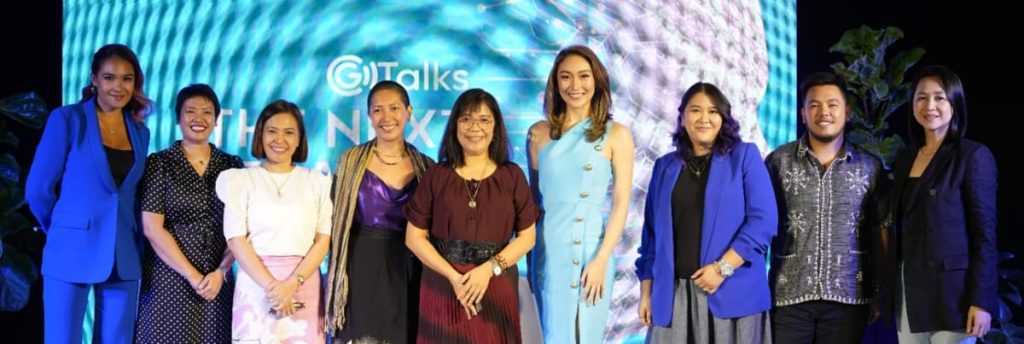
GCash, the Philippines’ leading finance app and largest cashless ecosystem, sparked a dialogue on the support needed by young women to enter and stay in the science, technology, engineering, and mathematics (STEM) fields. Through GCash’s “GTalks: The Next Generation”, leaders in the industry, government, and the academe engaged in conversation with University of the Philippines Diliman students from the Economics, Statistics, and Engineering colleges. The event also highlighted the opportunities available to young women in STEM fields.
GCash regularly holds GTalks as a space to engage stakeholders about social issues relevant to Filipinos, including gender inequality. For “GTalks: The Next Generation”, the first of a series of conversations this year, GCash recognized the value of bringing women leaders in technology and students together, so they can be empowered to pursue a career in STEM despite the challenges being faced by women in the industry.
The challenges remain startling. Based on the World Economic Forum’s Global Gender Gap Report 2023, only 29.2% of the global STEM workforce are women.
Encouraging Young Women to Pursue STEM in Higher Education
The challenge of getting more women to join and thrive in STEM careers starts during their formative years.
Xavier Alpasa, Center Advisory Committee Member of the TESDA Women Center, noted that young women are conditioned at a very young age to think “math is tough” or that there is a spatial skills disparity because of how toys for girls are designed. This was corroborated by Marie Aubrey Villaceran, Director of the UP Center for Women’s and Gender Studies, who shared that gender norms and stereotypes have affected fields, skill sets, and even ways of thinking or doing.
“We have a 2019 baseline study on women in STEM, and one of the things that did not encourage them is the lack of representation. There were no role models,” Villaceran explained. “Representation matters. ‘I feel seen, and I feel like I can belong here.’”
Alpasa pointed out that the available support and training remain to be insufficient and offered his “3M” guidance. “First it means—there should be greater access to support for formal and informal education. Second is mentorship—we need more women leaders, and girls need to talk to someone who has made it. Third is metric—we need to measure the share of women in any space,” he said.
Enabling more young women to thrive in STEM careers have to do with taking advantage of available opportunities and tools, as well as changing the narrative.
Michelle Alarcon, co-founder of For the Women, emphasized that digital platforms have allowed anyone anywhere to learn, and these have benefited many women. For the Women provides free scholarships for data science for underprivileged women, and the foundation’s experience shows that technology can level the playing field for women in terms of access to opportunities.
The broader challenge is on changing the narrative. Department of Information and Communications Technology Cybercrime Investigation and Coordination Center (DICT-CICC) Assistant Secretary Mary Rose Magsaysay stated that based on her experience women are better investigators than men.
“Change the narrative and the way we say things—always go with the positive. When we open our mouths, we start directing and leading,” Magsaysay stated.
The experience of many women leaders in the STEM fields is that gender should not define what’s possible for them.
“My advice? Just excel. You will find opportunities to create more spots for other girls. Leaders create opportunities. To be able to lead, you have to excel first. When you excel in the game, you can change the rules,” Alarcon emphasized
Cultivating an Inclusive Workplace
GCash Chief Data Officer Sara Venturina emphasized the importance of having women leaders in an organization, stating that this can be empowering and could lead to positive change.
“Women leaders are important in an organization, and there must be leadership commitment in creating a diverse and inclusive environment for women to thrive in tech,” Venturina said. “Having women leaders can mean inclusive hiring, flexible work arrangements, and more leadership and upskilling opportunities.”
Venturina noted that it is important for companies to not only look inward, but also outward, to cultivate a more inclusive work environment for women. “GCash is intentional in collaborating with government, the academe, and even NGOs to help women flourish more in the industry. When it comes to partnerships with the academe, we have internships available for young women. We also support non-formal channels for women in tech, such as our partnership with For the Women and Connected Women. Upskilling in fields like AI is not just about developing new skills, but also helping them in their financial journey, which aligns with GCash’s Finance for All vision,” she said.
Meanwhile, both Department of Trade and Industry (DTI) Assistant Secretary Leonila Baluyut, and physicist and Miss Earth 2017 Karen Ibasco highlighted the discrimination women can face and, therefore, must overcome in the workplace. Baluyut acknowledged that much more needs to be done by the Philippines to achieve economic independence, pointing out that while most microentrepreneurs are women, the men step in when the businesses grow.
Despite these challenges, both the public and private sectors are working toward creating opportunities for women, including DTI’s Startup Pinay initiative to get more women to be startup founders, as well as other efforts to help women entrepreneurs—which all Filipino women must be able to enjoy and take advantage of.
GCash remains committed to building a society that enables women from all fields, especially in the male-dominated STEM industry, to maximize their potential and impact. By setting the stage for meaningful and thought-provoking conversations through GTalks, GCash hopes to spark change so all Filipinos can thrive in a more inclusive society.
